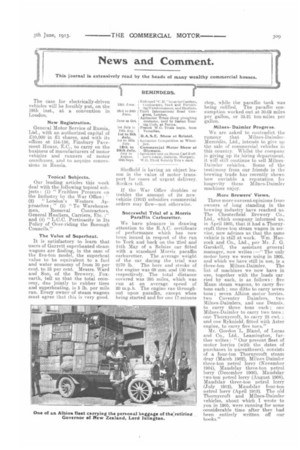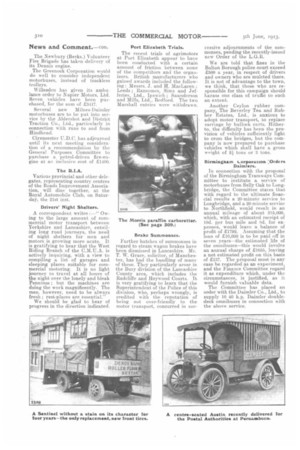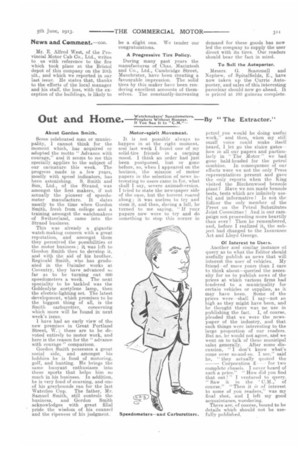News and Comment.
Page 11

Page 12

Page 13

If you've noticed an error in this article please click here to report it so we can fix it.
, This journal is extensively read by the heads of many wealthy commercial houses.
The case for electrically-driven vehicles will be forcibly put, on the 19th inst., at a convention in, London.
New Registration.
General Motor Service of Russia, Ltd., with an authorized capital of £10,000 in 21 shares, and with its offices at 154-156, Finsbury Pavement House, E.C., to carry on the business of manufacturers of motor vehicles and runners of motor omnibuses, and to acquire concessions in Russia.
Topical Subjects.
Our leading articles this week deal with the following topical subjects: (1) " Fruitless Pressure on the Industry by the War Office (2) "London's Western Approaches; " (3) "To Warehousemen, Removal Contractors, General Hauliers, Carriers, Etc. :'' and (4) " L.C.C. Pertinacity in Its Policy of Over-riding the Borough Councils."
The Value of Superheat.
It is satisfactory to learn that users of Garrett superheated steam wagons are finding, in the case of the five-ton model, the superheat value to be equivalent to a fuel and water economy of from 30 per cent. to 33 per cent. Messrs. Ward and Son, of the Brewery, Foxearth, tell us that the total economy, due jointly to rubber tires and superheating, is 5 lb. per mile run. Every owner of steam wagons must agree that this is very good. Sheffield is having an object lesson in the value of motor transport for eases of urgent delivery. Strikes tell.
If the War Office doubles or trebles the amount of its newvehicle (1912) subsidies commercial orders may flow—not otherwise.
Successful Trial of a Morris Paraffin Carburetter.
We have pleasure in drawing attention to the R.A.C. certificate of performance which has now been issued in respect of the run to York and back on the 23rd and 24th May of a Belsize car fitted with a standard Morris paraffin carburetter. The average weight of the car during the trial was 2570 lb. The bore and stroke of the engine was 69 mm. and 130 mm. respectively. The total distance covered was 395 miles, which was run at an average speed of 20 m.p.h. The engine ran throughout upon paraffin, except when being started and for one 17-minute stop, while the paraffin tank was being refilled. The paraffin consumption worked out at 30.69 miles per gallon, or 35,21 ton-miles per gallon.
Milnes. Daimler Progre as.
We are asked to contradict the rumour that Milnes-DaimlerMercedes, Ltd., intends to give up the sale of commercial vehicles in this country. Whilst the company is giving up its hiring department, it will still continue to sell MilnesDaimler vehicles. Some of the testimony from our friends in the brewing trade has recently shown how enviable a reputation for longevity these Milnes-Daimler machines enjoy.
More Brewers' Views.
Three more current opinions from owners of long standing in the brewing industry have reached us. The Chesterfield Brewery Co., Ltd., which company informed us. in April 1905, that it had a Thornycroft three-ton steam wagon in service, now advises us that the same vehicle is still at work. Wm. Hancock and Co., Ltd., per Mr. j. G. Garskell, the assistant general manager, now writes :—" The only motor lorry we were using in 1905, and which we have still in use, is a three-ton Milnes-Daimler. The list of machines we now have in use, together with the loads carried by each, is as follows : five Mann steam wagons, to carry five tons each ; one ditto to carry seven tons ; seven Albion motor lorries, two Coventry Daimlers, two Milnes-Daimlers, and one Dennis, to carry three tons each ; one Milnes-Daimler to carry two tons: one Thornycroft, to carry 25 ewt_ ; and one Ryknield. fitted with Aster engine, to carry five tons." Mr. Gordon L. Bland, of Lucas and Co., Ltd., Leamington, further writes : " Our present fleet of motor lorries (with the dates of purchases in parentheses), consists of a four-ton Thornyeroft steam dray (March 1902), II/Eines-Daimler three-ton petrol lorry (November 1901), Maudslay three-ton petrol lorry (December 1906), Maudslay two-ton petrol lorry (August 190S), Maudslay three-ton petrol lorry (July 1912), Mandslav four-ton netrol lorry (April 1913). The old Thornycroft and Milnes-Daimler vehicles, about which I wrote to you in 1905, were running for sonic considerable time after they had been entirely written off our books." The Newbury (Berks.) Volunteer Fire Brigade has taken delivery of its Dennis engine.
The Greenock Corporation would do well to consider independent motorbuses, instead of trackless trolleys.
Willesden has given its ambulance order to Napier Motors, Ltd. Seven vehicles have been purchased, for the sum of £3117.
Several new Milnes-Dairoler motorbuses are to be put into service by the Aldershot and District Traction Co., Ltd., particularly in connection with runs to and from Hindhead.
Cirencester U.D.C. has adjourned until its next meeting consideration of a recommendation by the General Purposes Committee to purchase a petrol-driven fire-engine at an inclusive cost of 21400.
The R.I.A.
Various provincial and other delegates, representing country centres of the Roads Improvement Associa tion, will dine together, at the Royal Automobile Club, on Saturday, the 21st inst.
Drivers Night Shelters.
A correspondent writes :—" Owing to the large amount of commercial motor transport between Yorkshire and Lancashire, entailing long road journeys, the need of night shelters for men and motors is growing more acute. It is gratifying to hear that the West. Riding Branch of the C.M.U.A. is actively inquiring, with a view to compiling a list of garages and sleeping places suitable for COM mercial motoring. It is no light journey to travel at all hours of the night over the lonely and bleak Pennines ; but the machines are doing the work magnificently. The men, however, need to be always fresh ; rest-places are essential."
We should be glad to hear of progress in the direction indicated. Port Elizabeth Trials.
The recent trials of agrimotors at Port Elizabeth appear to have been conducted with a certain amount of friction between some of the competitors and the organizers. British manufacturers who gained awards included the following: Messrs. J. and H. MacLaren ; Leeds ; Ransom.es, Sims and Jefferies, Ltd., Ipswich ; Saunderson and Mills, Ltd., Bedford. The two Marshall entries were withdrawn.
Brake Summonses.
Further batches of summonses in regard to steam wagon brakes have been dismissed in Lancashire. Mr. T. W. Grace, solicitor, of Manchester, has had the handling of many of these. They particularly arose in the Bury division of the Lancashire County area, which includes the Radcliffe and Heywood Courts. Tt is very gratifying to learn that the Superintendent of the Police of this division, who, perhaps wrongly, is credited with the reputation of being not over-friendly to the motor transport, concurred in sue
cessive adjournments of the summonses, pending the recently-issued new Order of the L.G.B.
We are told that fines in the Bolton Borough police court exceed £500 a year, in respect of drivers and owners who are mulcted there. It is not of advantage to the town, we think, that those who are responsible for this campaign should harass one class of traffic to such an extent.
Another Ceylon rubber company, The Beverley Tea and Rubber Estates, Ltd., is anxious to adopt motor transport, to replace carriage hy bullock carts. Hitherto, the difficulty has been the provision of vehicles sufficiently light to cross the bridges, but the company is now prepared to purchase vehicles which shall have a gross weight of 2 tons or 3 tons.
Birmingham Lorporatton :Orders Daimler's.
In connection with the proposal of the Birmingham Tramways Committee to institute a, service of motorbuses from Selly Oak to Longbridge, the Committee states that with regard to the ultimate financial results a 20-minute service to Longbridge, and a 20-minute service to Northfield, would result in an annual mileage of about 215,000, which, with an estimated receipt of 10d. per bus mile and Ext. for expenses, would leave a balance of profit of £1792. Assuming that the loan of £10,000 is to be paid off in seven years—the estimated life of the omnibuses—this would involve an annual charge of L1655, leaving a net estimated profit on this basis of £137. The proposal must in any case be regarded as an experiment, and the Finance Committee regard it as expenditure which, under the circumstances, is justified, as it would furnish valuable data.
The Committee has placed an order with the Daimler Co., Ltd., to supply 10 40 h.p. Daimler doubledeck omnibuses in connection with the above service. Mr. E. Alfred West, of the Provincial Motor Cab Co., Ltd., writes to us with reference to the fire which took place at the Bristol depot of this company on the 20th ult., and which we reported in our last issue. He states that, thanks to the efforts of the local manager and his staff, the loss, with the exception of the buildings, is likely to be a slight one. We tender our congratulations.
A Progressive Tire Policy.
During many past years the manufacture of Chas. Macintosh and Co., Ltd., Cambridge Street, Manchester, have been creating a favourable impression. The solid tires by this maker have been rendering excellent accounts of themselves. The constantly-increasing demand for these goods has now led the company to supply the user direct with its tires. Our readers should bear the fact in mind.
To Sell the Autoporter.
Messrs. G. Scarnmell and Nephew, of Spitalfielde, E., have now taken up the Currie Autoporter, and sales of this interesting parcelcar should now go ahead. It is priced at 100 guineas complete.


























